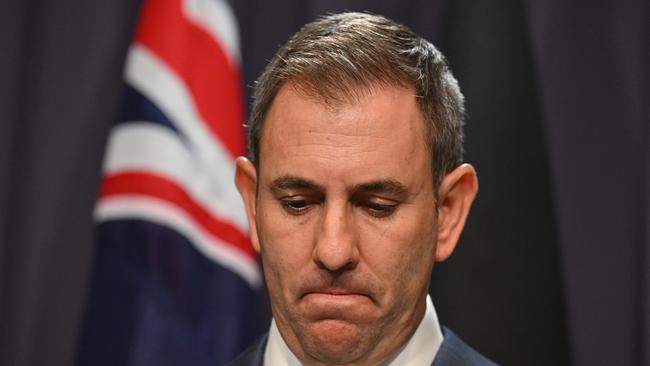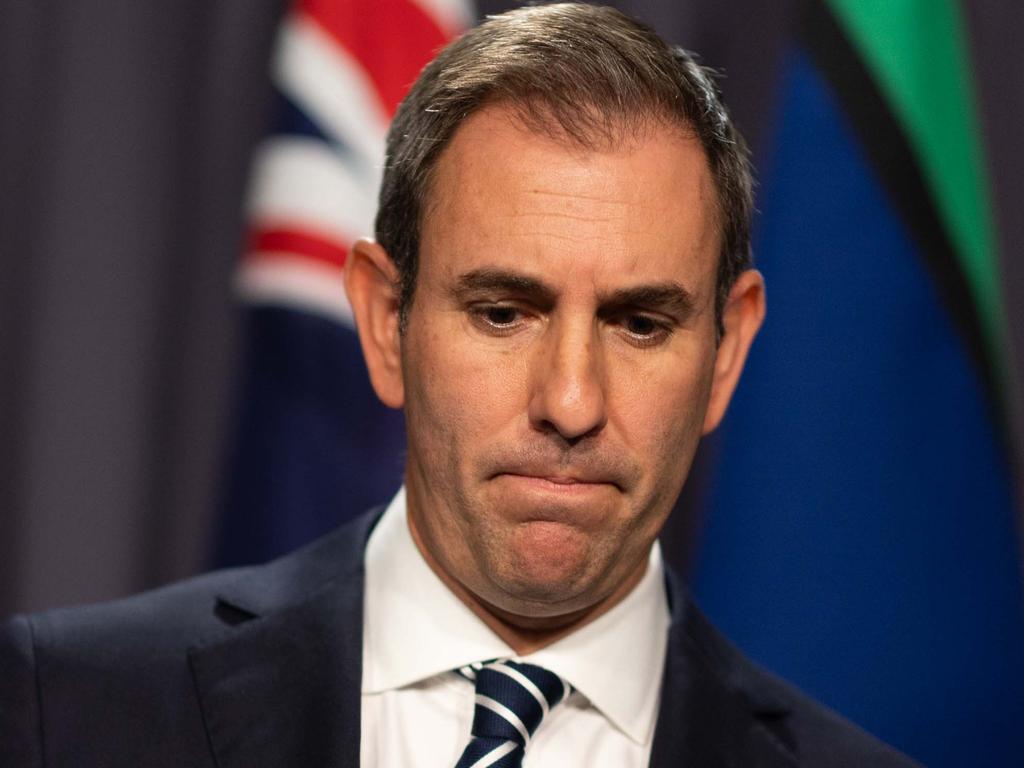Labor lacks political courage and policy guts over super changes
Both sides rely on virtue-signalling and class warfare rather than doing the heavy lifting of much-needed economic reform.

Putting to one side the debate over whether or not the super changes constitute a broken election promise, what has been announced is minor and affects very few of us. Half of 1 per cent of the population, according to Treasury.
Unsurprisingly, not very many Australians have more than $3m in their super accounts. The budget saving is minimal. If the Treasurer really wants to “fix the budget” and pay down the trillion dollars of debt both sides of politics have accumulated over the past 15 years, he’ll need to be much bolder than that.
Will Labor reverse the stage three tax cuts, for example? It has hinted at doing so but is yet to make a final decision. If it does that, saving to the budget would be major, but so would the broken promise. Not repealing stage three tax cuts was an unequivocal pledge. Breaking it would have real and tangible political consequences. Especially as a follow-on from other, more contestable broken promises.
But denying Australians what are already legislated income tax cuts – as tricky as the backflip could be – isn’t even the hard work Labor needs to embark on. Trimming the variety of tax minimisation options for the wealthy, increasingly also accessed by the middle class, should be on Labor’s agenda. Other than the fact it wasn’t part of its election agenda when it sought a popular mandate.
Budget repair also requires major spending cuts in areas that are often popular with the public, especially Labor voters. The NDIS, welfare more broadly, aged care and healthcare more broadly are all huge burdens on the budget. And these costs are ballooning at a drastic rate. Recurrent expenditure is out of control. Partly because of the ageing of the population, partly because of the soft touch by government when it comes to eligibility tests.
There is a third way Labor could pursue when repairing the budget, but there is nothing easy about that option either. It could start a national debate about what we as citizens expect from our governments.
If that conversation results in higher expectations, meaning better and more service delivery, then people need to understand such outcomes require higher rates of taxation. That is, a higher tax-to-GDP ratio than both sides of politics presently ascribe to.

Are Australians willing to be taxed more to get more? If so, how does government calibrate the mix? Do we trust it to efficiently spend even more of our money? This is why we need tax and federation summits to properly burrow into these important questions.
It’s also why we need politicians willing to embrace philosophical thought.
It isn’t good enough to simply virtue-signal with minor changes targeting the wealthy. Or, conversely, as also happens from time to time, small-fry savings targeting so-called “welfare cheats” and the like. That’s the Coalition’s version of virtue-signalling to its base.
I suspect Labor believes Australians should pay more tax to receive more benefits from government, in what would therefore be a fiscally sustainable approach. Notwithstanding the challenge that higher taxes can erode economic growth, and around we go.
But I highly doubt the government has the political courage to make that call and face an opposition scare campaign followed by a potential voter backlash at the next election.
The problem is that if Labor doesn’t go down that path, it needs to cut into tax concessions and ballooning recurrent government spending in heartland Labor policy areas. I doubt it has the stomach for that.
So without political courage or policy guts, where does that leave us? Most likely, with a tax system unfit for purpose and a new government that will watch debt grow and grow. Even if commodities prices deliver a short-term and temporary sugar hit to the budget bottom line, even a one-off surplus.
This is a problem, because it’s the home finances equivalent of living beyond your means. Countries, unlike individuals, are eternally living, meaning the comparison is limited because unlike individuals, nations do not have to budget for a time when their work-life earning days are over. New generations come along to pay new taxes, as the society lives on.
But the burden of debt is real for nations too, even if they eternally collect taxes. And, with interest rates on the rise, the burden of debt only grows. As a nation, our debt-to-GDP ratio is higher now than it has been in decades.
If Labor doesn’t seek to remedy this situation now, it is unlikely to do so in a second or third term, assuming the government lasts that long. History tells us new governments lose their reforming edge the longer in the tooth they become. Bob Hawke and Paul Keating did the hard work on micro-economic reforms in the early years after their 1983 election win. John Howard and Peter Costello’s first budget was their toughest (also their most popular, ironically enough, according to the polls).
GST reform was announced in the Howard government’s first term, and legislated in the second.
One of the reasons the Labor and Coalition governments thereafter fell flat was because they didn’t do the same.
Kevin Rudd squibbed structural budget reform and even moderate action on climate change when the going got tough. Unwilling to risk his political skin when the Senate blocked his ETS, and refusing to call a double-dissolution election.
Tony Abbott tried to legislate a tough first budget but was stung by pre-election promises contrary to his announcements. This sets up a political comparison that would likely make Anthony Albanese bristle: is he at risk of becoming the next Abbott if he tries to do the right thing in policy terms, but in doing so takes a political risk that brings his government (or just himself) undone?
This is the tragedy of modern politics. Leaders feel compelled to rule out precisely the sort of options that they need on the table when they come to government if they are to do their jobs effectively.
Peter van Onselen is a professor of politics and public policy at the University of Western Australia and Griffith University.








As Labor announces and floats various minor policy changes designed to claw back savings, it has to confront one simple reality: if it wants to repair the structural holes in the budget it must do much more than virtue-signalling.